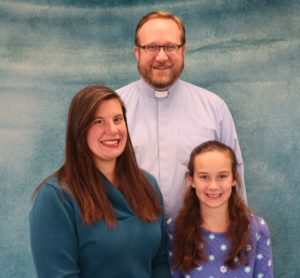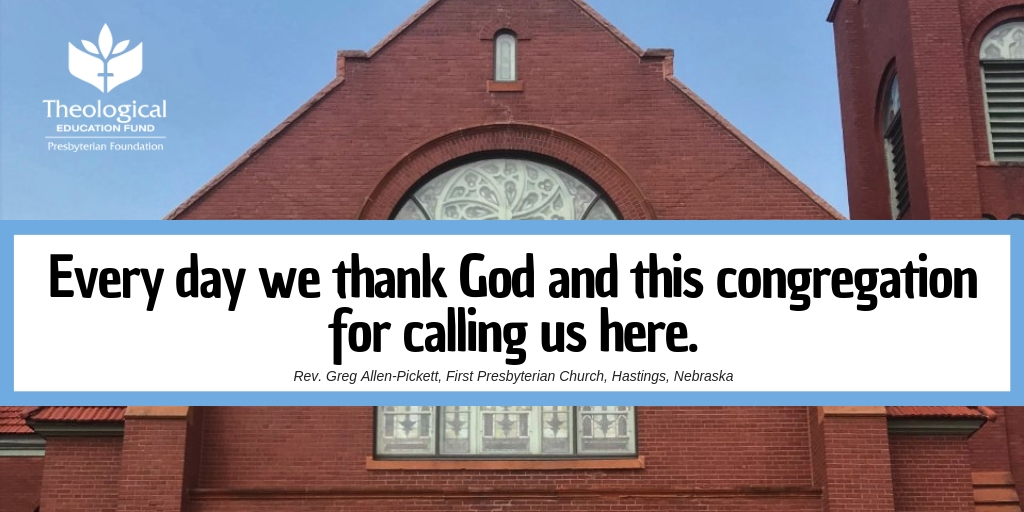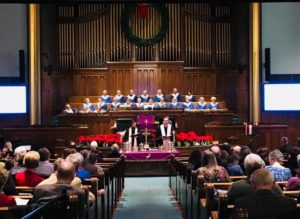Midwestern Ministry Context: A glimpse of the good life
October 14, 2018 by Greg Allen-Pickett
When I told my wife that I was discerning a call to a church in Nebraska, she gave me that look. You know the one, with an eyebrow raised and a hint of incredulity. “What city?” she asked. “Hastings.” “Never heard of it.” And that was true. Neither of us had ever heard of Hastings, Nebraska.

It has now been 20 months since I accepted a call to serve as pastor of First Presbyterian Church in Hastings. Every day we thank God and this congregation for calling us here. Many of our preconceived notions about central Nebraska have been shattered, some have been affirmed, and we have discovered so many things to love about living, working, playing, sharing life and doing ministry with the amazing people who inhabit this part of our country.
We live in a town of 25,000 that is surrounded by corn and soybean fields. Despite the image that might conjure in your mind, this is a vibrant community full of life and incredible opportunities for families, cultural activities, and ministry. Let me share a glimpse of what that looks like.
On Sunday mornings, I usually wake up and head into church in time to catch the sunrise. Nebraska has beautiful sunrises! The church begins to buzz with life as we prepared for our 8:30 a.m. Taize-style contemplative service. After a refreshing early morning worship experience, our Sunday School hour kicks off with a cadre of committed volunteer Sunday School teachers. We also offer two different adult education opportunities each Sunday that are full. Nebraskans love to engage their hearts and minds in their faith. Our 10:30 a.m. worship service is led by choir and organ in a place that still appreciates traditional church music. We are also a hymn-singing congregation! People here still love to sing hymns and belt them out with joy and gusto.
One of the great things about our church is that we have people of every age and political persuasion sitting side by side and worshiping together. There are very few locales left in our country where people from across the political spectrum share space together, sitting side by side and raising their voices to glorify God. Another benefit of serving a church in the Midwest is that church-life plays a central part of the life of the community. People still make time for church on Sunday morning, Wednesday evening, and throughout the week. Our building is full of people more often than it isn’t, and people still seem to prioritize church in their lives in the Midwest.

Opportunities to pursue ministries of mission, compassion and justice abound as well. When I arrived at our church, I thought about starting ESL classes for our Spanish speaking neighbors. I realized there were already some great classes in town. So instead, led by members of our congregation, we have started Spanish classes that meet weekly so that our primarily English-speaking congregation can reach out to our Spanish-speaking neighbors. That has expanded into a Mexican folkloric dance group that meets in our church which includes members of our congregation. This connection between a historically white church and the Hispanic/Latino population continues to grow. Last month our session unanimously voted to serve as a collection point and distribution center for donations to immigrant families in the event of an immigration raid that could separate parents and children.
Our church also coordinates with our neighboring United Methodist church to organize a mobile food pantry once a month and serves an average of 400 families with a free food distribution. This year we are working with sociology professors and students from nearby Hastings College to study the root causes of poverty and hunger in our community so that we can begin to address those too. We collect supplies to send to the Pine Ridge Reservation, and we assemble and ship hygiene kits following disasters. And our church has a rich history of short-term mission that has sent a high school mission team somewhere around the country every summer since 1966.
I want to share one more anecdote that represents the deep and authentic blessing of serving a congregation in the Midwest. Over the summer, we had funerals for six beloved saints in our community. Then last week, I presided over a funeral for a farmer who died in an accident during harvest season. Each of these deaths brought profound grief to the family, the congregation, and the community. What gave me hope (in addition to the opportunity to witness to the resurrection) was the way that the community turned out to support the families. I’ve never experienced anything quite like it. I was also blown away by the incredible cross section of the community that showed up to support each other. At one of the funerals, one pall bearer was a garbage man and another was a prominent doctor in town. Another funeral included a procession of Harley-Davidson motorcycles, 32 of them. Their engines roared a hymn of grief and a song of celebration of a life well lived, providing comfort and joy to the grieving family. And riding those Harleys was a beautiful diversity of people representing a broad cross-section of our community. Opportunities for incredible ministry abound in rural Midwest communities.

If you think that “rural Midwest communities” might not have much to offer culturally, think again. Last week, my wife and I were leaving our local bistro that serves wine from all over the world along with creative tapas and light dishes. We were torn between going to one of the microbreweries in town to hear live music or going to a farm-to-table dinner in a shabby chic barn that has been converted into an event space. (We picked the farm-to-table dinner.) The next morning we woke up and went to the farmers market to pick up fresh produce for the week. Then we had to decide between going to a college volleyball game or a Fall Harvestfest at a local farm. That night we could have attended a community theatre production or gone to the “The Lark,” a concert venue that features local and national musicians. We opted to stay home, since Sunday is a work day for me.
Another blessing in this place is the low cost of living. I moved here from Atlanta and was in Denver before that. Home ownership on a pastor’s salary in a big city can be a stretch. Here it is a whole lot easier. That’s not to say that the real estate market is perfect. In some of these smaller towns there isn’t a lot of turnover in the housing market, but it is an affordable place to buy a house and turn it into a home. Restaurants are also more reasonable, so we get to eat out a little more here than we did before. And during the summer, fresh produce, of all kinds, magically shows up on your doorstep or in the church office, keeping you well stocked with fresh vegetables and fruit. In fact, the produce is so abundant that we have learned how to preserve it by taking up canning and buying a chest freezer.
I hope that gives a sense of context and life in this place. The state slogan for Nebraska is “The Good Life,” and we can affirm that. If you are willing to invest your heart into communities like these, you will find yourself blessed many times over in return. There is an incredible sense of joy that comes from serving in a place like this.
My prayer is that seminarians and seasoned pastors alike will open themselves up to the possibility of serving in America’s heartland!
Rev. Greg Allen-Pickett is Pastor and Head of Staff of First Presbyterian Church in Hastings, Nebraska. He is a native of Flagstaff, Arizona, where he was an active member of Federated Community Church. Greg is a graduate of Pacific Lutheran University in Tacoma, Washington, and he also holds an Master of Divinity degree from Austin Presbyterian Theological Seminary. Greg has worked in small, medium, and large churches and also worked at the PC(USA) denominational offices in Louisville as the general manager of Presbyterian World Mission.
Blog Credit: https://www.presbyterianfoundation.org/midwestern-ministry-context-a-glimpse-of-the-good-life/
Editor’s note: During October, we exploring the need for pastors in rural communities, with a focus on Nebraska. Executive Presbyter and Stated Clerk for the Presbytery of Central Nebraska Rev. Polly Deppen-Williams contacted us recently to discuss the need for pastors, and we decided to take a deep look at the need for pastors there as a microcosm for much of the rural U.S. Hers was the first post in this series, and you can read it here. What we’re hearing from Presbyteries is that there are plenty of openings in these rural communities, but not enough candidates. In this post, we’re publishing a piece by Rev. Greg Allen-Pickett, pastor of First Presbyterian Church in Hastings, Nebraska. We hope you’ll engage with us as we explore this topic. — Rev. Dr. Lee Hinson-Hasty, Theological Education Fund